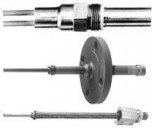Corrosion Probe
About Corrosion Probe

Corrosion Probe :
Corrosion Probe : A corrosion probe having in combination at least one first, at least one second, and at least one third electrode. A dielectric is positioned between the electrodes, and the dielectric has a structure defining an ionically conductive surface. An apparatus for measuring the corrosion rates of metals, or the like, in a corrosive liquid environment comprising the corrosion probe, a potentiosat electrically attached to the electrodes of the corrosion probe, and a signal generator electrically communicating with the potentiostat.
The apparatus also has a voltmeter and an ammeter. A process for measuring the corrosion rates of metals in a corrosive liquid environment comprising attaching electrically the corrosion probe to a potentiostat. The corrosion probe is inserted into the corrosive liquid environment and either a predetermined known current is signaled to the potentiostat or a predetermined known difference in potential is signaled to the potentiostat.
Corrosion is the gradual destruction of material, usually metals, by chemical reaction with its environment. In the most common use of the word, this means electrochemical oxidation of metals in reaction with an oxidant such as oxygen. Rusting, the formation of iron oxides, is a well-known example of electrochemical corrosion.
This type of damage typically produces oxide(s) or salt(s) of the original metal. Corrosion can also occur in materials other than metals, such as ceramics or polymers, although in this context, the term degradation is more common. Corrosion degrades the useful properties of materials and structures including strength, appearance and permeability to liquids and gases.
Contact For More Technical Details: contact@oilandgasproducts.com




































